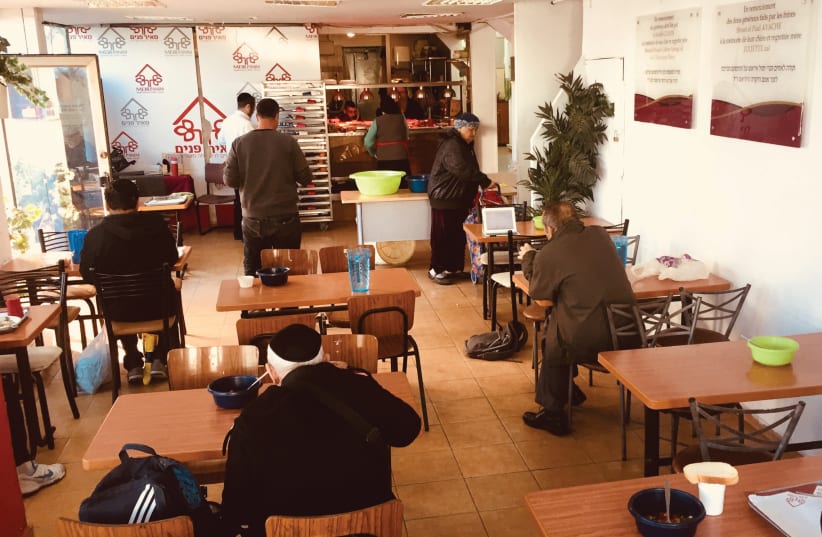Residents and tourists alike are familiar with the begging hands of Jerusalem’s poor as they walk down the Ben-Yehuda Street pedestrian mall or the main roads of affluent neighborhoods.Jerusalem is the poorest city in the country, according to a recent report by the Central Bureau of Statistics, with nearly half of the city’s residents living under the poverty line. Dozens of the city’s most needy meet for lunch Monday through Thursday on Hazvi Street near the central bus station, at Meir Panim.Goldie Sternbuch, director of overseas relations for Meir Panim, explained that the foundation of the nonprofit’s food services is its network of free restaurants in cities throughout Israel. These restaurants, she said, are in lieu of soup kitchens, designed to look and feel like any other restaurant so that diners can preserve their dignity. “Nobody wants to feel like they are a charity case or just another number,” said Sternbuch. “They want to be seen and treated like a person.” I admit that while Sternbuch’s words sounded lovely, I did not believe she had objectively described the situation when I pulled up to the Meir Panim restaurant, with its filthy windows and taped front door. A large, metal lock hung tightly sealed on the entrance. A lonely homeless man was digging his way through a pile of donated clothing that lay strewn on the sidewalk by the side door.
However, when the front door opened I was immediately struck by the aroma of food wafting through the air. Chicken soup, I thought – and I was right. A man in a white shirt and a woman with a long skirt and an apron greeted me with a smile, showing me to a table. Within the first 10 minutes, I was joined by at least a dozen other diners. As each visitor entered, they were shown to their table, served their food on an oversized tray, with the kind and familiar phrase “B’teavon!” which is hard to translate, but basically means “Enjoy your meal!”Most people chose to sit alone and eat in silence. Some were so hungry that they shoveled the food into their mouths, going back for seconds or filling disposable plastic containers to take home for later. An argument ensued over an allegedly stolen salad, but mostly the atmosphere was pleasant. A playlist by Yishay Ribo, who sings a mix of Israeli soft rock and hassidic tunes, hummed quietly in the background. The staff never stopped smiling, and the food was fresh. A colorful salad sat in a plastic bowl on every table. The plates were loaded full of lentils, pasta, two kinds of chicken, mashed potatoes, green beans, carrots and fruit.The smell, look and taste of the meal is what my bubbie would call heimishe essen (Yiddish for home-style food). It tasted like home.Sternbuch said each meal costs around NIS 25. She said Meir Panim participates in a food rescue program, recapturing fresh food that might otherwise be discarded by two local hotels.“Every day we pick up the food and serve it for lunch,” said Sternbuch. “But we are always cooking something to go with it, too, because we want people to feel like they are coming home to fried onions and soup and not to a sterile soup kitchen.”A nutritionist reviews the daily meals to ensure they include all of the main food categories and vitamins that are vital for proper nutrition, which needy individuals can ill-afford.Diners also have the option of taking home packaged food to eat in the privacy of their own home. Sternbuch says there is one mother who comes in daily to pick up packages of food from the restaurant and then recooks it on her own stove, “so her kids think she is cooking food for them.”“Jerusalem is a melting pot of different people with different backgrounds,” said Sternbuch. “They all have culinary preferences and health limitations, and we try to address all of those that we can handle.”Within a year, Meir Panim will have a newer, larger facility, according to Sternbuch. A donor made a large gift that will enable the charity organization to open a larger restaurant with a higher standard of presentation. Sternbuch described a layout with quiet corners for those who want to eat alone, and large banquet-style tables so visitors can socialize. Some tables will face windows and other tables will look toward walls, to accommodate the different preferences of the restaurant’s visitors. In addition to its network of restaurants, Meir Panim delivers packaged meals to homebound individuals each day and distributes prepaid shopping cards, resembling credit cards, before the High Holy Days and Passover, among other projects.“No one is immune,” Sternbuch said, pointing out the recent nearly 2,000 local Teva Pharmaceutical employees who were just laid off. “Our work is vital to society.”
